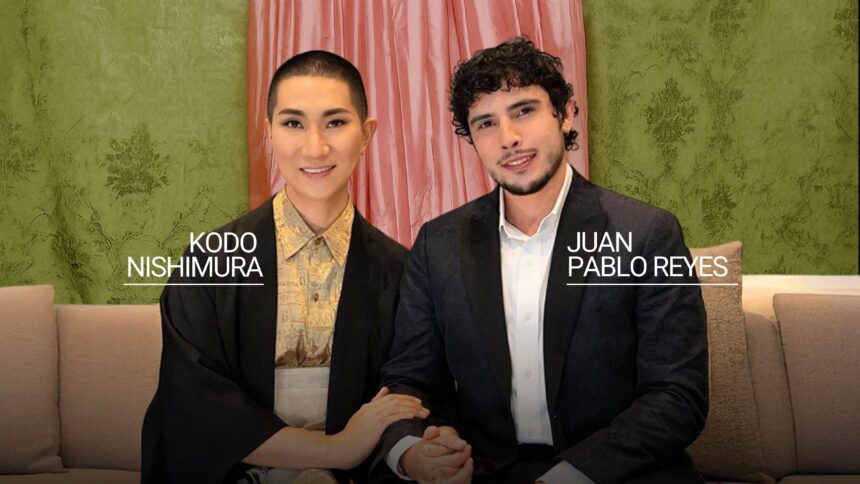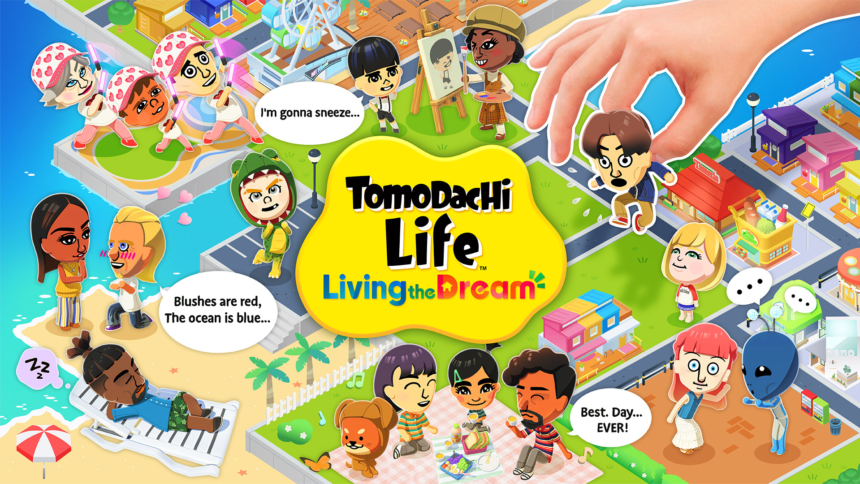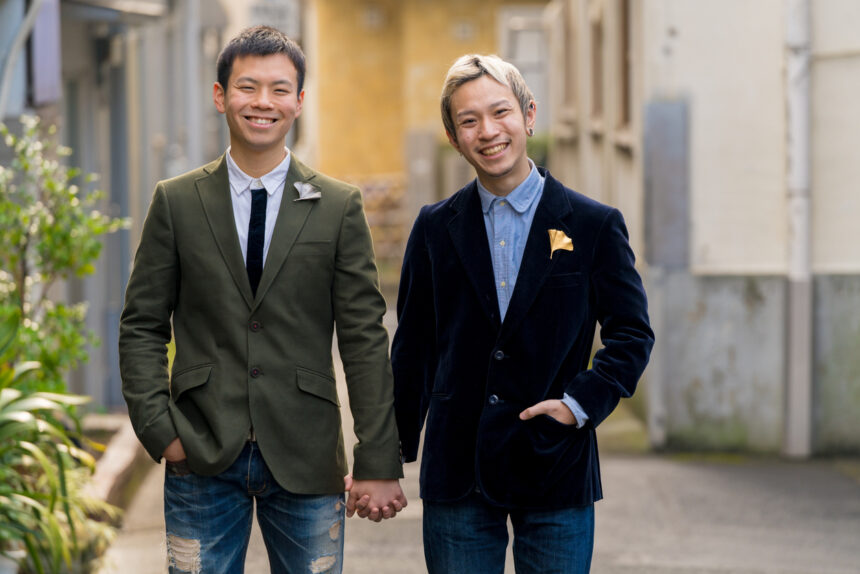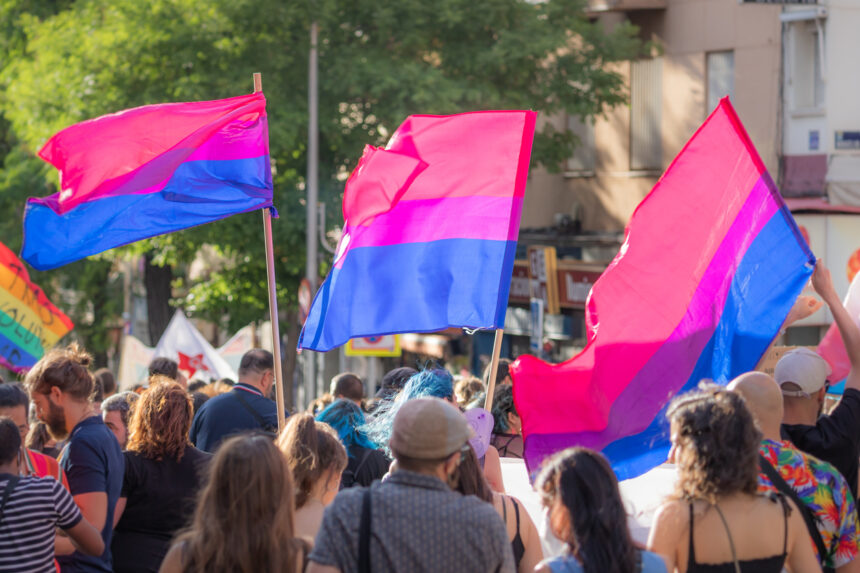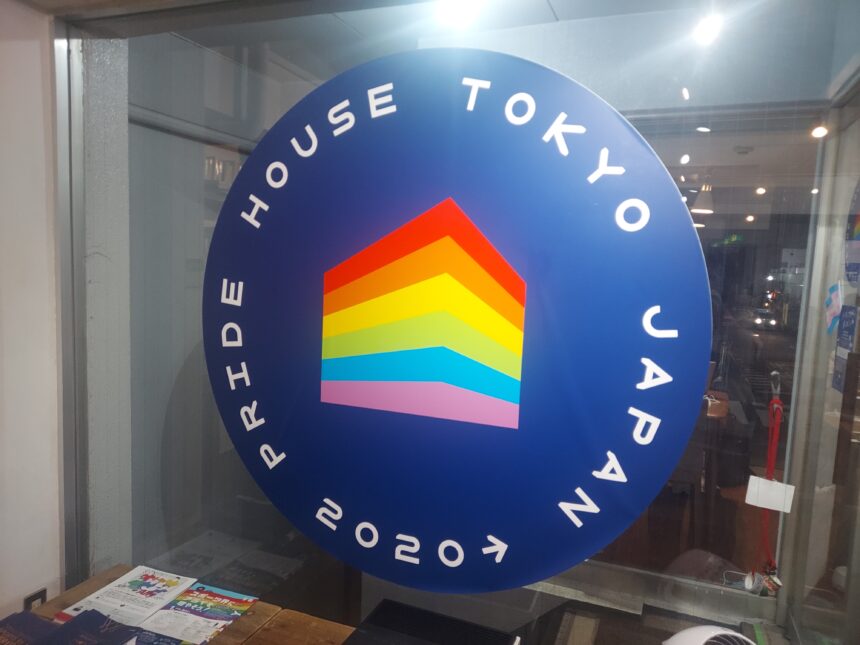In some ways, this can feel like a dark time for LGBTQ+ people in Japan. Some politicians — including many in the recently successful far-right populist Sanseito party — are insisting that recognition for LGBTQ+ people and the gains that they have made over the past few decades should be ignored or even rolled back in the name of “traditional” Japanese values. However, such voices do not have a monopoly on what traditional Japanese values are, or how they should be expressed.
Kodo Nishimura is an artist, activist, and Buddhist monk, following in the footsteps of his father, who is also a monk in the Jodo-Shu tradition, a branch of the Pure Land school of Buddhism. On the 25th of June, 2025, Kodo Nishimura, along with his husband, Juan Pablo Reyes, a photographer and art director from Colombia, gave a seminar at United Nations University (UNU) in Tokyo to discuss their lives and experiences.
About the Speakers: Kodo Nishimura and Juan Pablo Reyes
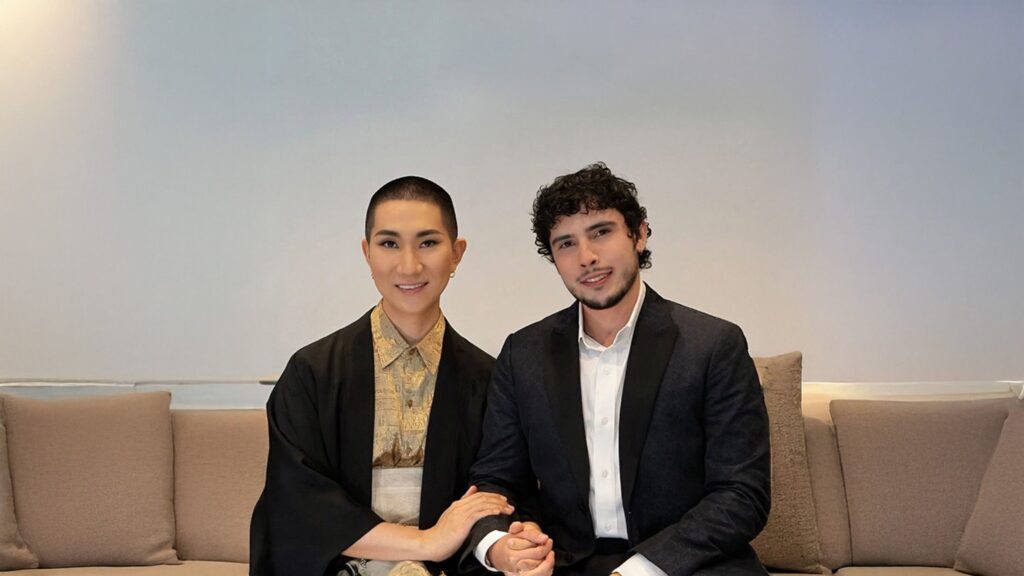
Hosted by Tshilidzi Marwala, the Rector of UNU and Under-Secretary-General of the United Nations, the discussion began by recounting the lives of the two speakers. Nishimura began by reminding people that, although he was born in a temple (it is difficult to imagine anything more traditionally Japanese than this) he enjoyed pretending to be a princess during games as a child, with The Princess Diary being a particular inspiration.
It was in part due to his love of that film that he became inspired to live study in the US. After high school, he moved to New York to study make-up and fine arts, before returning to become a Buddhist monk.
Reyes explained that in Colombia, unlike in Japan where the seasons follow one another, all four seasons can exist at the same time — Bogotá is autumn, the Caribbean coast is summer, Medellín is spring, and the mountains are winter with snow.
“We are very warm and positive people. But that isn’t because we are always comfortable, or because life is easy. It’s because Colombians are able to find joy and beauty in the difficult times of instability during the 1980s and 1990s.”
The pair met in a tapas bar in Spain, as both of them were traveling. Kodo was there for meetings about publishing his book in Spanish, when he discovered that Juan was working at a publishing company in Bogotá, supporting authors. Kodo asked for his advice, and what began as a professional exchange soon blossomed into romance, and they married. But what does this romance, and this marriage, mean for them here in Japan?
The Challenges for Same-Sex Couples in Japan
Marwala then moved on to ask the pair about the legal and cultural difficulties that the pair have faced in Japan.
“Well, Juan’s parents are very nice, perfect even,” Nishimura replied. “And my mother welcomed him as well. But my father was initially not quite as welcoming — not because he didn’t like Juan, but because that he read about Colombia in the newspaper would often be quite negative. He was also a little hurt, I think, that I got married without asking him.”
Nishimura detailed how his father would, when he was younger, always ask his son to keep quiet and refrain from coming out, or wearing make-up. This did not come from a place of hate, however, but a desire to protect his son.
“For him, to stand out meant to put yourself in danger: he thought I might get attacked. I didn’t realize, at first, that he did and said the things he did out of love.
“Now, we have a much better relationship — and he even keeps trying to lend Juan his ties to wear!”
He also noted that the lack of marriage equality in Japan made it difficult for them to stay together year-round, as Nishimura could only stay in Colombia for three months at a time, while Reyes can only stay in Japan for three months at a time.
Reyes also noted general difficulties as a foreigner in Japan that he experienced, and that many others may have, as well.
“Even without the added complication of being homosexual, moving to another country always presents difficulties. However, if you move to Colombia, after three months, if you can speak Spanish we say, ‘you’re Colombian.’ In London, there is a large immigrant community that you can be a part of,” he explains.
“But in Japan, while there are no people harassing us for being gay, or holding hands in public, I am still not seen as a local, even after learning the language and customs.”
However, in a later Q&A session, Nishimura was eager to note that local governments were becoming more and more understanding for same-gender couples.
“We have a Partnership Oath Certificate from the Minato government. It’s really good, and I want to see this system in place more across Japan,” he said. “However, it is more important that Japan legalizes marriage equality. This can make a huge difference, even to children: when I was growing up, I was told that men could only be with women, and it felt like not being cast in the play of life: there was no part for me.”
Indeed, before the two met, Reyes fondly reminisces on how Nishimura had bought himself his own engagement ring.
“He thought that if he needed to have a ring to prove that someone else loved him, he’d get his own, because he loved himself, and then could enjoy life with his friends and family,” he recalls. “But then, we met each other.”
Buddhism and Sexuality: Reconciling Tradition with Inclusion
Of course, the thing that distinguishes Nishimura from many of his peers in the LGBTQ+ community is his being a fully-fledged Buddhist monk. Given that Japan, even if it is more accepting of LGBTQ+ people today than even just a few decades ago, can still be somewhat conservative, how did Nishimura fuse his practice of Buddhism with his sexuality in a way that few today have?
“I used to think that Buddhism was very strict, having grown up in a temple,” Nishimura explains. “I used to think that I had to be very manly, and let go of all of my desires. When my training began in earnest, though, I realized that Buddhism celebrates everyone, and was created to emphatically say ‘no’ to discrimination.”
He received similar teachings from his mentor, a professor, who taught him that what one wears and why one wears it is unimportant to Buddhism and its teachings. The only thing that matters, he was taught, was that everybody is equally liberated, free of discrimination, because while we are different, we share a common world.
Reyes elaborates, “The metaphor I like to think of is that of a plane. When we board a plane, we all pray that the weather will be good, and that the pilot will do a good job. We are also all looking forward to seeing loved ones, or going somewhere new, or going home.”
“And you’ll notice that people on planes tend to be very polite to each other. We’re all a little scared, but we all have dreams. We might have different purposes, but we’re all here together. Why make it more difficult for someone else?”
Towards the Future of LGBTQ+ Rights in Japan
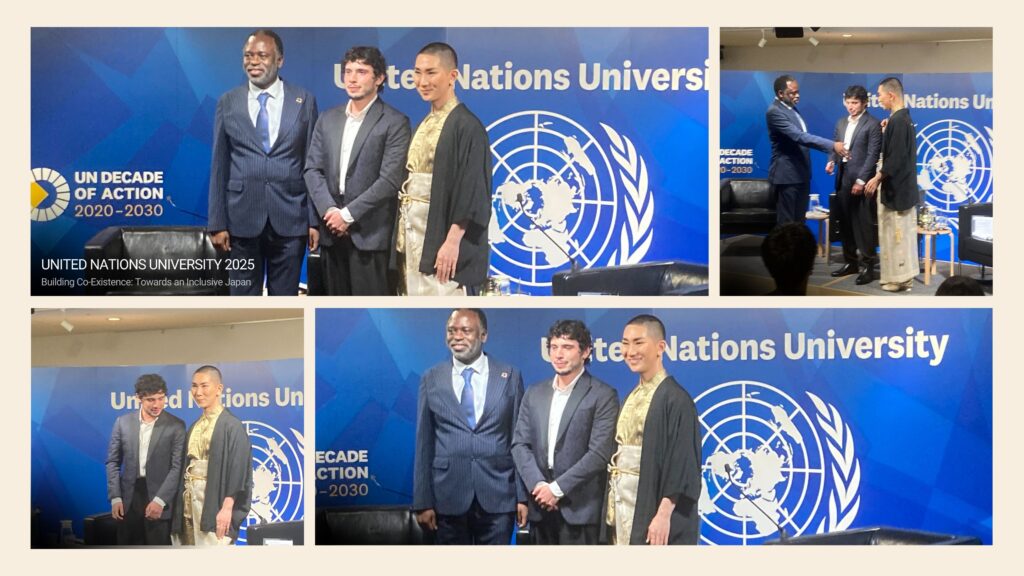
There have been a number of significant strides for LGBTQ+ people in Japan since Nishimura first moved to the US in 2007. Nishimura notes that pop culture — including TV shows, movies, and the global success of The Boyfriend on Netflix — has been more readily showing queer characters, and that this has been met with growing tolerance in the real world.
“When I go to a bookstore, there are LGBTQ+ sections. When I read the Asahi Shimbun, there are stories about gay couples,” he says. “When I was a child, I didn’t know what the word ‘gay’ meant. Now, I can talk about LGBTQ+ rights with my husband on stage at UNU. Japan has become a good country for us, for our family.”
What, though, does he think about the obstacles still to overcome?
In the The Dhammapada, the Buddha instructs us that “Drop by drop is the water pot filled. Likewise, the wise man, gathering it little by little, fills himself with good.”
Asked about the future of the LGBTQ+ community in Japan, Nishimura settles on a similar metaphor. When a guest at the event inquired as to his thoughts on the progress of queer rights in Japan, especially in the light that, while the majority of Japanese people approve of marriage equality, the national government has yet to make any changes, he invites us to consider the growth of a tree.
“A tree needs time to grow. Even if we give it an abundance of water today, it will not grow immediately, even if we desperately want to see the flowers today” he explains.
“However, if we continue to water our tree, even if it not ready yet, one day it will grow tall and strong, and its flowers will blossom. So don’t give up, and continue to do good.”

